Reformed GCSEs graded 9-1 were awarded in English and mathematics for the first time in England last year.
This year sees the first awards in a range of other major subjects, including science, modern foreign languages, art and design, geography and history, among others.
So how many entries achieved the top grade, grade 9?
In the reformed GCSEs, grades 9-7 cover the range previously covered by grades A*-A. In other words, there is greater differentiation at the top end of the attainment distribution – three grades in the place of two.
Under Ofqual’s approach of comparable outcomes, which ensures consistency of standards even when qualifications are reformed, it is expected that the proportion of entries graded 9-7 in a subject will be similar to the proportion awarded A*-A in the previous year assuming that the cohort of 16-year-olds taking the subject does not change markedly in terms of prior (Key Stage 2) attainment.
Ofqual determined a rule such that around 20% of entries awarded a grade 7 or higher would be awarded grade 9. In practice, it is slightly more complicated than that:
Percentage of those achieving at least a grade 7 who will be awarded a grade 9 = 7% + 0.5 × (percentage of students awarded grade 7 and above)
The chart below shows the percentage of grade 9s awarded to 16-year-olds in England in newly reformed subjects in 2018, compared to the percentage of 16-year-olds in England who achieved grades A*-A in 2017.
As the chart shows, there is a lovely relationship between the two. This is not the sort of thing that happens by chance. Firstly, percentages of students achieving grades 9-7 this year are very similar to percentages achieving A*-A last year and secondly, percentages awarded grade 9 are a function of the percentage awarded 7 or above.
Put another way, we should be able to make a reasonable estimate of the percentage of entries that will be awarded grade 9s in next year’s batch of reformed subjects (such as business studies and design & technology) on the basis of the percentage achieving A*-A this year.
It’s bordering on tautological, but it’s in the subjects that tend to be entered by higher attaining students that more grade 9s are awarded: classical subjects (here Latin and classical Greek) and the triple sciences.
If we look back to the 2017 data, we can see that just 11% of the entries in Latin and 5% of the entries in classical Greek were from non-selective state-funded mainstream schools. Given that the results of students in independent schools and selective state schools are ignored when using comparable outcomes in the awarding process, this is a remarkably small pool of results. Presumably the expert judgment of examiners is more crucial in these subjects.
How many students achieved straight 9s?
There has been a curious amount of interest in how many students might achieve straight 9s in all subjects.
It seems to have started with a throwaway remark on Twitter by the then-chief scientific adviser at the Department for Education that only two students would do so. Tom Benton from Cambridge Assessment then produced some excellent research showing that it would, in fact, be several hundred.
Today Ofqual has answered the question once and for all. A total of 732 students who took at least seven reformed GCSEs achieved grade 9 in all of them.
Given that fewer grade 9s are awarded than grade A*, it should come as no surprise that fewer students will achieve straight grade 9s compared to straight grade A*s.
Grade 9s are hard to come by. Anyone achieving at least one has done really well.



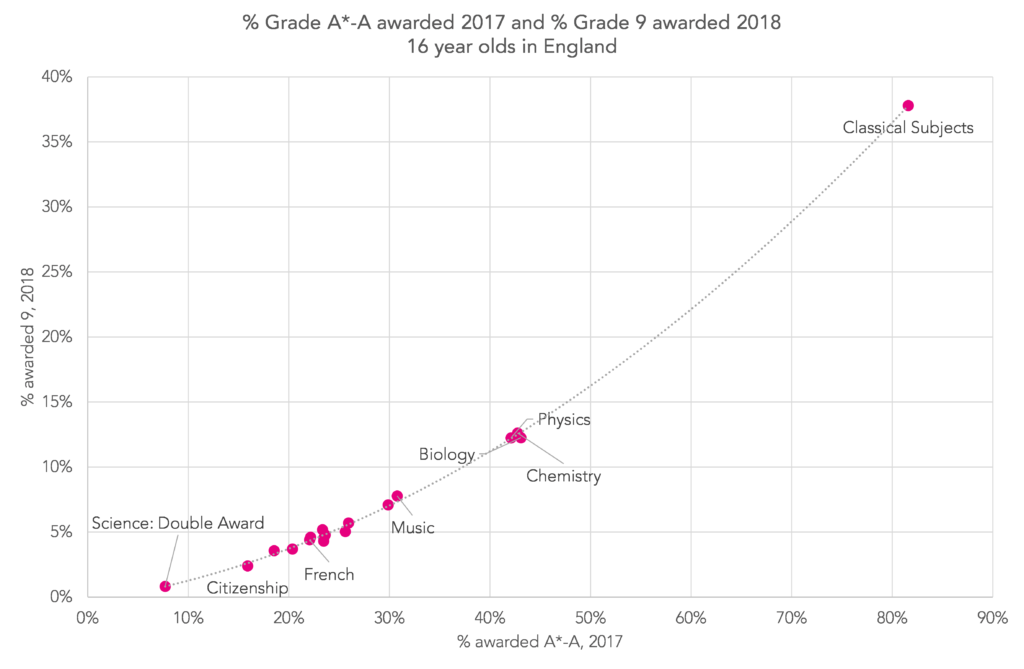
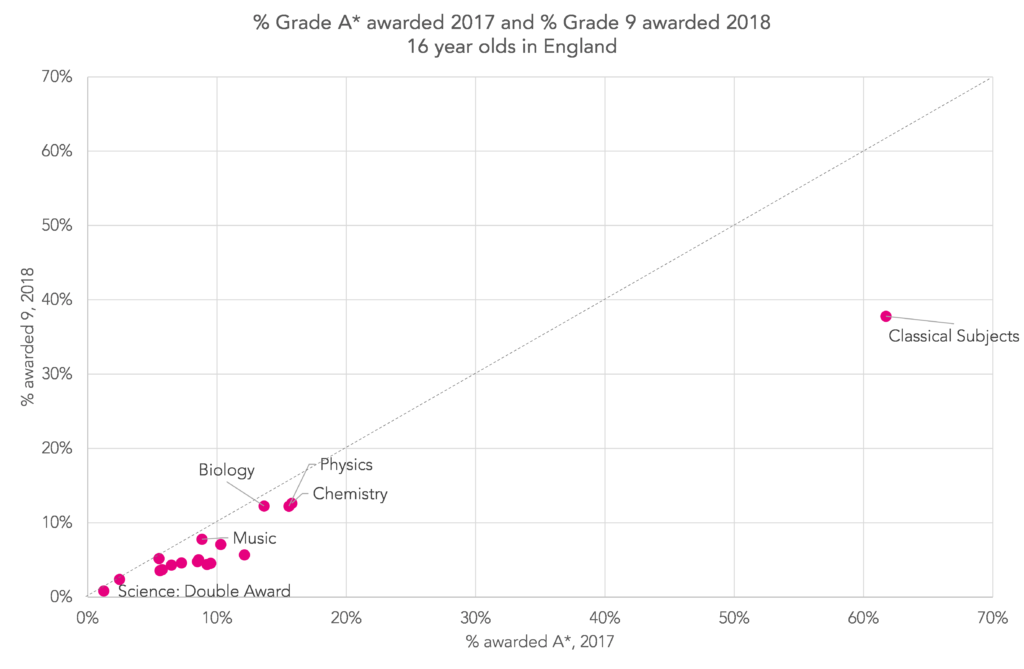

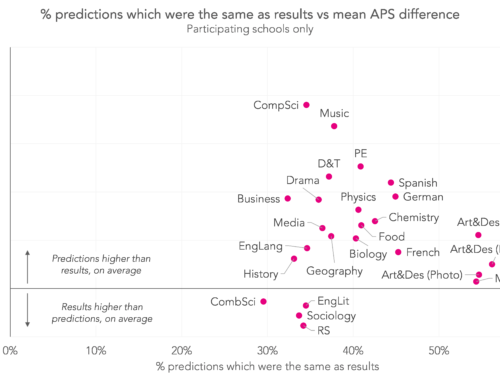

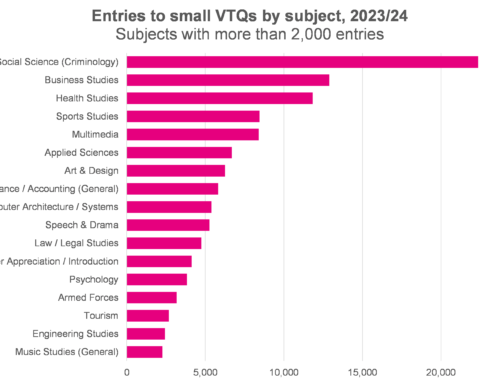
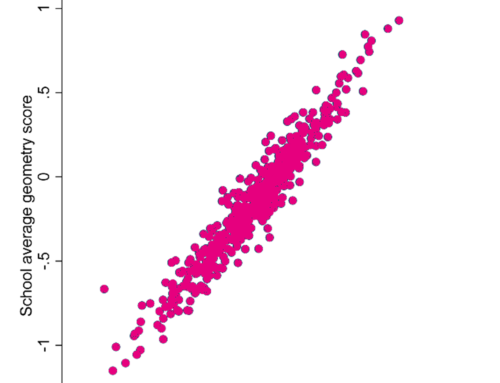
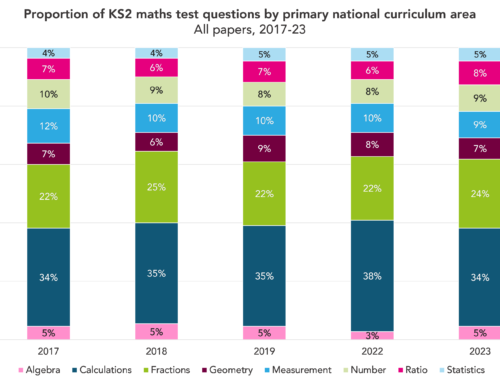
Great research here thank you.
Would it be possible to assess how many students received 10 or more straight grade 9s in the reformed subjects from both state and the independent sector?
Thanks for the kind comments, David. We should be able to carry out more analysis of who achieved grade 9s a little later in the year, once 2018 pupil-level data is available.
I also wondered how many pupils received 10 x Grade 9s results this summer, as my daughter, at a state comprehensive in the East Riding of Yorkshire did.
Helen Cottingham, East Riding of Yorshire.
I wanted to know the same as my son got 10 9’s and 2 8’s last summer
It’s got to be a very very low number surely but then if those 732 kids who got 7 or more were that. Bright I guess there’s a good chance they followed through and got another couple 🙂
Hi
My daughter did GCSE exams in 2018. She received grad 9 in five subjects , grad 8 in four subjects and grad 7 in one subject. Is there any way I can find out her ranking in the whole of the England GCSE. I read only 732 students got ALL 9s but there is not a website that can tell me the same information about my daughter’s grades.
Hello Massoud – there isn’t, that I’m aware of, I’m afraid.
Best,
Philip